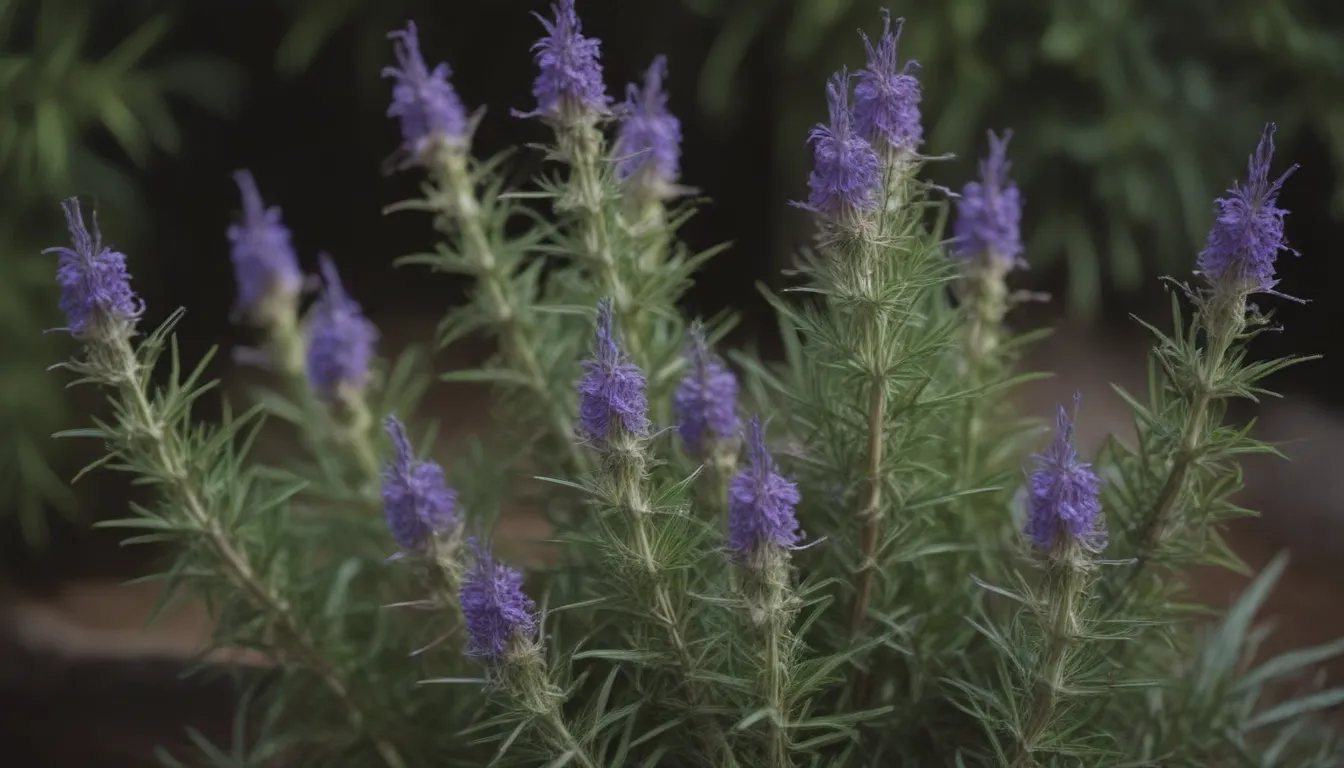The Ultimate Guide: 25 Best Companion Plants for Rosemary (and What Not to Plant)

Are you looking to enhance your garden with the beauty and benefits of rosemary? Planting rosemary not only adds a delightful herb to your garden but also offers a range of advantages for its companion plants. Rosemary’s strong scent acts as a natural pest repellent, protecting nearby plants from insects. Additionally, the aromatic compounds released by rosemary can enhance the flavor of other plants, like vegetables and fruits, creating a healthy and thriving garden for you to enjoy.
Companion planting is a gardening practice that involves planting different crops together to maximize space and provide mutual benefits. By strategically placing companion plants with similar needs, you can prevent diseases, repel insects, and improve soil quality. While some recommendations are based on long-time gardeners’ observations, the effectiveness of companion planting may require some trial and error in your own garden.
Rosemary thrives in sunny conditions and prefers drier soil, so it’s essential to choose companion plants that can coexist harmoniously with these requirements. In this comprehensive guide, we’ll explore the 25 best companion plants for rosemary that can help you create a vibrant and flourishing garden.
The Benefits of Companion Planting
Before we delve into the list of companion plants for rosemary, let’s explore the numerous benefits of companion planting:
- Preventing diseases and insect infestations
- Improving soil quality
- Enhancing flavor and growth of plants
- Maximizing space in your garden
Keep in mind that the success of companion planting may vary based on your garden’s specific conditions and the plants you choose to grow. Now, let’s discover the ideal companion plants that can thrive alongside your rosemary.
Lavender: A Perfect Pairing
Lavender is an excellent companion for rosemary due to its Mediterranean roots and similar maintenance needs. Both herbs thrive in warm environments with full sun exposure and well-draining soil, making them ideal companions in your garden. With lavender by its side, rosemary gardens only need to be watered approximately once a week, simplifying maintenance tasks.
Alyssum: Attracting Pollinators and Repelling Pests
Alyssum flowers are versatile companions for rosemary as they attract beneficial pollinators with their white blooms. The pungent scent of rosemary acts as a natural deterrent against pests, protecting the delicate stems and leaves of your plants. By combining alyssum with rosemary, you can create a pollinator-friendly garden filled with vibrant colors.
Sage and Rosemary: Herb Garden Duo
Sage is another herb that complements rosemary perfectly, sharing similar growing requirements and flavor profiles. Rosemary enhances the health and taste of sage, making it an ideal addition to your herb garden. Together, these herbs form a harmonious partnership that not only benefits your garden but also enriches your culinary creations.
Thyme: A Protective Ally
Thyme is a valuable companion plant for rosemary, offering both culinary and protective benefits. While thyme pairs well with rosemary in dishes, it also acts as a natural deterrent against cabbage worms, safeguarding your garden from unwanted pests. With thyme and rosemary working together, you can cultivate a vibrant and insect-free garden.
Oregano: Flavorful Companions
Oregano is a flavorful herb that thrives alongside rosemary, sharing similar maintenance requirements such as full-sun exposure and well-drained soil. These two herbs complement each other beautifully, enriching your garden with robust flavors and easy-to-grow companions. Additionally, oregano’s low-growing nature helps protect the topsoil from erosion, promoting soil health in your garden.
Marjoram: Growth Enhancer and Flavor Booster
Marjoram provides numerous benefits as a companion plant for rosemary, releasing specific chemicals into the soil to promote faster plant growth and enhance the flavor of surrounding vegetables. By planting marjoram with rosemary, you can create a thriving garden teeming with rich flavors and robust plant growth.
Borage: Beautiful and Low-Maintenance
Borage is a stunning starflower herb that thrives as a companion plant for rosemary, sharing similar growing conditions and soil requirements. With borage in your garden, you can enjoy vibrant blooms and low-maintenance companionship. This herb’s preference for slightly moist, well-drained soil aligns perfectly with rosemary’s needs, creating a harmonious growing environment.
Chives: Universal Companions
Chives are versatile herbs that complement a wide range of plants, including rosemary. Not only do chives enhance the flavors of neighboring plants, but they also offer natural pest control by repelling insects like aphids. By incorporating chives into your garden with rosemary, you can create a flavorful and pest-free oasis for your plants to thrive.
Marigolds: Colorful Protectors
Marigolds add a pop of color to your garden while serving as protective companions for rosemary. Their strong scent repels insects such as flies and mosquitoes, complementing the pest-repellent properties of rosemary. By planting marigolds with rosemary, you can create a vibrant and lively garden that’s safe from pesky insects.
Zinnias: Pollinator Magnets
Zinnias are excellent companion plants for rosemary, attracting pollinators to your garden and enhancing its overall beauty. These colorful flowers thrive in the same growing conditions as rosemary, creating a harmonious environment for both plants to flourish. By including zinnias in your garden, you can attract beneficial pollinators and promote the health of your plants.
Cabbage: Edible Garden Delight
If you’re interested in growing an edible garden, consider planting cabbage as a companion to your rosemary. Rosemary’s natural repellent properties keep cabbage moths and worms at bay, allowing your veggies to grow healthy and strong. By strategically placing rosemary near your cabbage plants, you can enjoy a pest-free garden that’s both productive and aromatic.
Beans: Soil Enrichers
Beans are nitrogen-fixing plants that improve soil quality and promote healthier growth for your rosemary plants. While beans may attract pests like the Mexican bean beetle, planting them alongside rosemary can mask their scent and deter bugs effectively. By incorporating beans as companion plants, you can enrich your garden’s soil and support the growth of your rosemary.
Carrots: Flavorful Pairing
Carrots make excellent companions for rosemary, benefiting from its aromatic qualities and pest-repelling properties. By planting carrots near your rosemary, you can create an edible garden that’s free of carrot flies and other pests. Since carrots require more water than rosemary, it’s best to plant them on the ends of the rows to ensure they receive adequate moisture while coexisting harmoniously with your rosemary plants.
Peppers: Delicious Protection
Peppers are delicious vegetables that thrive alongside rosemary, benefitting from its insect-repelling qualities. Rosemary helps repel aphids, spider mites, and other pests that may threaten pepper plants, creating a protective barrier around their base. By planting rosemary near your pepper plants, you can deter insects and maintain optimal soil moisture for healthy growth.
Strawberries: Sweet and Symbiotic
Growing strawberries alongside rosemary can enhance the flavor of the sweet fruits and repel insects that are attracted to them. Both plants contribute to soil fertility and weed suppression, creating a symbiotic relationship that benefits your garden. By incorporating rosemary as a companion for strawberries, you can enjoy an abundant harvest of flavorful and pest-free fruits.
Blueberries: Berry Bliss
Blueberries thrive when planted alongside rosemary, sharing similar soil and environmental needs that promote healthy growth. Rosemary’s natural repellent properties help protect blueberries from pests, ensuring a bountiful harvest of delicious fruits. By cultivating a harmonious relationship between rosemary and blueberries, you can enjoy the benefits of homegrown berries in your garden.
Raspberries: Fragrant Pairing
Similar to blueberries, raspberries benefit from the presence of rosemary as a companion plant in the garden. By planting raspberries near rosemary, you can enhance the flavor of the fruits and deter insects that may harm the plants. Both raspberries and rosemary thrive in sunny spots with well-drained soil, creating an ideal environment for healthy growth.
Apple Trees: Strong Scent Protection
While apple trees require more space than rosemary plants, they can still benefit from having rosemary as a companion. Rosemary’s strong scent acts as a deterrent for critters that may be attracted to ripe apples, helping protect your harvest. By strategically placing rosemary near your apple trees, you can create a barrier against pests and enjoy a fruitful garden.
Cherry Trees: Insect-Repelling Duet
Planting rosemary around the trunk of cherry trees can help repel insects and protect the fruits from potential damage. The eucalyptus-like scent of rosemary confuses insects, making it difficult for them to locate the cherry trees and cause harm. By incorporating rosemary as a companion for cherry trees, you can enhance the health and productivity of your garden.
Brussel Sprouts: Cruciferous Companions
Brussel sprouts, like mini cabbages, are excellent companion plants for rosemary due to their shared family affiliation and growing requirements. Rosemary enhances the flavor of Brussel sprouts while deterring insects that may target the miniature bulbs. By planting rosemary alongside Brussel sprouts, you can enjoy a healthy and thriving garden that’s protected from pests.
Onions: Aromatic Allies
Onions make great companions for rosemary, thanks to their repelling scent that deters insects and pests. The shallow roots of onions coexist harmoniously with rosemary’s deep roots, creating a natural barrier against unwanted pests in your garden. By strategically planting onions near rosemary, you can enjoy a pest-free garden that’s both flavorful and aromatic.
Parsnips: Flavorful Roots
Parsnips benefit greatly from the presence of rosemary as a companion plant, as it enhances the flavor of these light carrot-like vegetables. Rosemary infuses extra flavor into parsnips as they grow, creating a harmonious partnership that results in delicious and aromatic crops. By incorporating rosemary as a companion for parsnips, you can enjoy flavorful and pest-free vegetables in your garden.
Garlic: Aromatic Duo
Garlic and rosemary make a delightful pairing, amplifying each other’s flavors and repelling insects effectively. By planting garlic next to rosemary, you can enhance the taste of your crops and deter pests from infesting your garden. Both garlic and rosemary share similar soil requirements, making them easy to maintain and cultivate together.
Broccoli: Cruciferous Companionship
Broccoli benefits from the insect-repelling properties of rosemary, making them ideal companions in the garden. Plant broccoli near rosemary to take advantage of its natural deterrent against pests and promote healthy growth. While rosemary and broccoli have different soil needs, you can maintain them effectively by keeping them in separate containers or rows.
Cauliflower: Scented Protectors
Cauliflower plants thrive alongside rosemary, benefiting from its insect-repelling qualities and flavorful aroma. By planting rosemary near your cauliflower plants, you can create a protective barrier against pests and promote healthy growth. While rosemary is more drought-tolerant than cauliflower, you can ensure both plants receive adequate moisture by strategically placing them in your garden.
Worst Companion Plants for Rosemary
While there are numerous plants that can thrive alongside rosemary, it’s essential to be mindful of plants that may not be compatible due to conflicting needs or characteristics. Here are five plants that are not recommended as companions for rosemary:
- Basil: Despite being a popular herb, basil may not be the best companion for rosemary due to potential competition for resources.
- Mint: Mint’s invasive nature and aggressive growth can overpower rosemary plants, leading to overcrowding and nutrient depletion.
- Tomatoes: Tomatoes have different soil and sunlight requirements than rosemary, making them incompatible companions in the garden.
- Pumpkin: Pumpkins require ample space to sprawl and may overshadow the growth of rosemary plants, affecting their access to sunlight.
- Cucumber: Cucumbers have high water needs and may compete with rosemary for moisture, leading to potential water stress for both plants.
By avoiding these incompatible companion plants, you can create a harmonious and thriving garden that maximizes the benefits of rosemary and its companions.
Conclusion
In conclusion, companion planting offers a range of benefits for your garden, from pest control and disease prevention to improved soil health and flavor enhancement. By strategically choosing companion plants that align with rosemary’s growing requirements and characteristics, you can create a vibrant and flourishing garden that’s both aesthetically pleasing and productive.
Whether you’re looking to enhance the flavor of your crops, repel pests, or attract pollinators, there are numerous companion plants that can complement and support rosemary in your garden. By incorporating a diverse range of herbs, flowers, vegetables, and fruits as companions for rosemary, you can create a thriving ecosystem that promotes biodiversity and sustainability in your garden.
Remember to experiment with different companion plants, observe the interactions in your garden, and adjust as needed to optimize the growth and health of your plants. With careful planning and thoughtful selection of companion plants, you can create a beautiful and productive garden that nurtures and sustains your plants for years to come.
So, why wait? Start planting your rosemary garden today and watch as these companion plants work their magic alongside this versatile and beneficial herb. Happy gardening!





